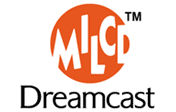Difference between revisions of "Mil-CD"
From Sega Retro
m |
m |
||
| Line 1: | Line 1: | ||
| − | + | [[File:milcd_logo.png|right]] | |
| − | |||
| − | + | {{sub-stub}}'''Mil-CD''' was a compact disc storage format created by [[Sega]] in 1998 to add multimedia features to normal CDs for use on the [[Sega Dreamcast]]. It was present 8 title in only Japan. | |
| − | + | As code was not authenticated, it allowed hackers to run their own code on the Dreamcast, opening the way to [[:Category:Unlicensed Dreamcast games|homebrew games]] and demos from the Dreamcast's early years. | |
| − | |||
| − | |||
| − | |||
| − | |||
| − | + | Later models of the Dreamcast discontinued support for Mil-CD. | |
| − | [[Category: | + | |
| + | == Discs == | ||
| + | *''[[Nine Chairs]]'' (1999) | ||
| + | *''[[Kita e. White Illumination Pure Song and Pictures]]'' (1999) | ||
| + | *''[[Heartbreak Diary]]'' (1999) | ||
| + | *''[[Checkicco no Miru CD]]'' (1999) | ||
| + | *''[[Hang the DJ]]'' (1999) | ||
| + | *''[[Himitsu Original Sound Track]]'' (1999) | ||
| + | *''[[D2 Original Sound Track]]'' (1999) | ||
| + | *''[[Space Channel 5 Ulala The Movie]]'' (1999) | ||
| + | |||
| + | == External Links == | ||
| + | *[http://web.archive.org/web/20010314190533/http://www.sega.co.jp/milcd/home.html About Mil-CD (Sega)] (Japanese Archive) | ||
| + | *[http://www.dricas.com/special/milcd/index.html About Mil-CD (Dricas)] (Japanese) | ||
| + | *[http://www.dcemu.co.uk/vbulletin/threads/26670-History-of-Dreamcast-Hombrew-%28retrorevival-co-uk%29 Dreamcast Hack] | ||
| + | |||
| + | [[Category:Mil-CD]] | ||
| + | [[Category:Hardware]] | ||
Revision as of 07:52, 12 July 2015
This teeny-tiny article needs some work. You can help us by expanding it.
Mil-CD was a compact disc storage format created by Sega in 1998 to add multimedia features to normal CDs for use on the Sega Dreamcast. It was present 8 title in only Japan. As code was not authenticated, it allowed hackers to run their own code on the Dreamcast, opening the way to homebrew games and demos from the Dreamcast's early years.
Later models of the Dreamcast discontinued support for Mil-CD.
Discs
- Nine Chairs (1999)
- Kita e. White Illumination Pure Song and Pictures (1999)
- Heartbreak Diary (1999)
- Checkicco no Miru CD (1999)
- Hang the DJ (1999)
- Himitsu Original Sound Track (1999)
- D2 Original Sound Track (1999)
- Space Channel 5 Ulala The Movie (1999)
External Links
- About Mil-CD (Sega) (Japanese Archive)
- About Mil-CD (Dricas) (Japanese)
- Dreamcast Hack
